Monetizing your expertise through an online course is an excellent way to share your knowledge on everything from Excel spreadsheets to ice fishing. However, the success of your online course business depends not just on your content but also on your course platform. Opting for a platform that doesn’t align with your business’s trajectory, lacks critical features, or fails to connect you with your audience in meaningful ways can significantly hinder your growth and success.
To help you identify the right platform for your business, we’re diving into Kajabi alternatives. Kajabi is one of the most popular platforms in the online course space, but in a booming market, there’s good reason to weigh your options before making a final decision. First, let’s look at what makes Kajabi a creator favorite, then why you should consider other platforms, and finish with an in-depth list of top Kajabi alternatives.
Let’s get started!
Skip ahead:
A Kajabi Overview
Kajabi is a comprehensive, all-in-one tool for online course creators, coaches, podcasters, and more. The platform allows creators to monetize their content, collect payment, track analytics, manage customer relationships, build websites and landing pages, and so much more.
Top Kajabi features:
- Monetize with online courses, podcasts, and memberships
- Create websites, email campaigns, a mobile app, and landing pages directly on the platform
- Replace your CRM with Kajabi’s native relationship management features like customer tags and action triggers
Kajabi pricing:
Kajabi offers three pricing plans. They are:
- Basic ($149/month)
- Growth ($199/month)
- Pro ($399/month)
Notably, Kajabi’s pricing plans are some of the most expensive plans in the industry. In the list of Kajabi alternatives below, you’ll find many platforms with free trials and free plans, ranging from 0% transaction fees up to 10%.
Why look for a Kajabi alternative?
While Kajabi claims to have helped creators build over 100,000 businesses, some common themes in Kajabi’s feedback lead those creators to look for alternatives. They are:
- Monthly costs – Kajabi doesn’t currently offer a free plan. And to make matters worse, its paid plans start well above the $100 mark, creating a pricing floor some of its fiercest competitors don’t even touch with their highest-paid plans.
- Challenges with email marketing and landing pages – At such a high premium, the last thing creators want are challenges when creating digital assets like email campaigns and landing pages. Unfortunately, many users report that these things can be clunky and require workarounds to get the desired result.
- Technical know-how required – Some users report that the interface can be challenging for both creators and users to engage with, making it difficult for users to find their course and for creators to change some digital assets.
- Missing features – Existing users long for two common features: a customizable checkout page and the ability to bundle offerings.
Recognizing these common challenges with the Kajabi platform, it’s clear why some creators are looking for a better fit. With that in mind, let’s turn to a curated list of top alternatives to Kajabi.
| Kajabi alternative | Free plan available | Transaction fees | Pricing plans |
| Yes | No |
| |
| Yes | Yes |
| |
| Yes | Yes |
| |
| No | Yes |
| |
| Yes | No |
| |
| No | No |
| |
| Yes | No |
| |
| Yes | Yes | N/A | |
| No | No |
| |
| Yes | Yes | N/A | |
| Yes | Yes |
| |
| No | No |
| |
| No | No |
|
13 Kajabi Alternatives 2024
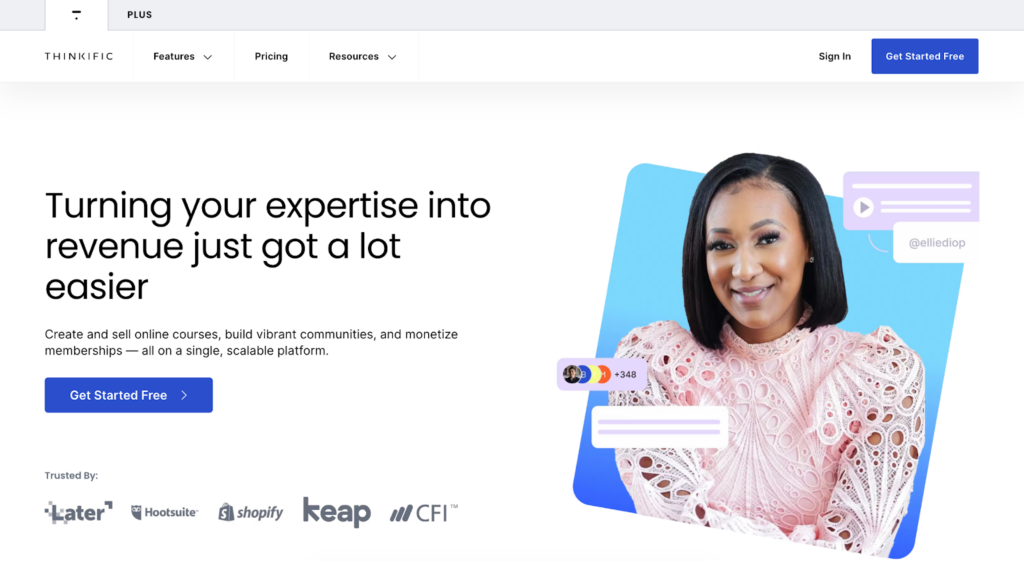
Thinkific is an industry leader in the online course platform space. The platform is trusted by businesses of all sizes, from brands as big as Hootsuite and Shopify to creators like George Pitts and Evelyn Wood, who have grown their courses to reach thousands of students with Thinkific.
Known most for its course creation abilities, Thinkific allows creators to craft in-depth experiences for their students. The platform provides custom web themes and domains, supports integrated quizzes and assignments, and offers live lessons and events.
Additionally, creators can grow a community right on the platform in designated community spaces and engage with their student communities in a branded mobile app. Should creators need help, Thinkific offers best-in-class support on all plans.
Top Thinkific features:
- Branded mobile experience for courses and communities
- Custom web themes and domains
- Community spaces and notifications
- Comprehensive library of learning resources, templates, guides, and more
Thinkific pricing:
Thinkific’s five pricing options accommodate creators and businesses with a wide range of needs.
- Free Plan
- Basic Plan ($49/month)
- Start Plan ($99/month)
- Grow Plan ($199/month)
- Plus Plan
While many things about Thinkific make the platform a strong alternative to Kajabi, its generous free plan is one of its strongest attributes. The free plan lets you create one course and community, allows unlimited students, and boasts a 0% transaction fee. This means the money you make on the free plan is all yours.
As your business grows and you’re ready to scale, the Basic, Start, and Grow plans allow for even more courses, communities, and payment strategies. On average, Thinkific plans cost 50% less than the comparable Kajabi alternative.
Check out our comparison Thinkific vs. Kajabi page here if you want more info.

Teachable is another online course platform that acts as a home base for most online course business needs. The platform caters to online course creators, online coaches, and community leaders, offering digital downloads, sales, and marketing features, native AI technology, and additional integrations to select from should your needs require more than the platform can support on its own.
Top Teachable features:
- Integrated AI technology for faster content creation
- Sales and marketing tools, like gated content and affiliate marketing
- User-friendly website builder
Teachable pricing
Like Thinkific, Teachable offers a wide range of plans to accommodate a broad set of needs.
- Free
- Basic ($59)
- Pro ($159)
- Pro+ ($249)
- Business ($499)
However, unlike Thinkific, Teachable’s free plan does include a hefty transaction fee of $1 + 10%. So, while the plan doesn’t technically limit your growth, creators are incentivized to opt for larger, more costly plans as the transaction-free rates get smaller the more you pay.
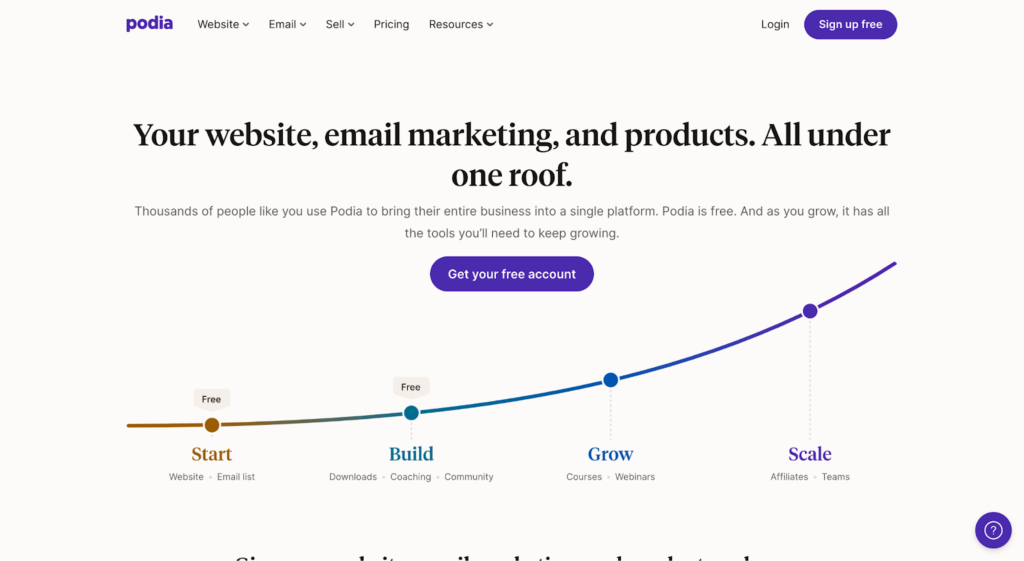
Podia is a consistent favorite in lists of Kajabi alternatives. Like its predecessors in our list, Podia offers a comprehensive platform for online course creators, allowing creators to sell courses, coaching, webinars, and more. Additionally, you can develop communities, track marketing metrics, and build a website directly on the platform.
Top Podia features:
- Host a blog or create landing pages on your Podia website
- Launch an email marketing campaign with free templates
- Sell a variety of digital products, from online courses and workshops to online coaching and exclusive community access
Podia pricing
Podia offers four pricing plans. They are:
- Free
- Starter ($9/month)
- Mover ($39/month)
- Shaker ($89/month)
Like Teachable, Podia’s free plans also impose a transaction fee, starting with 10% for the free plan, tapering down to 5% with the Mover plan, and finally disappearing at the Shaker plan.
All plans include at least one website, community, digital download, and coaching product, with the Mover and Shaker plans offering unlimited of each.

LearnWorlds is another all-in-one online course platform. This platform boasts a clean, modern, and intuitive interface that makes it easy to create online courses, build a website or mobile app, and dive into your analytics and reporting. LearnWorlds is an excellent solution for customer training, enterprise-level learning, online coaching, and more.
Top LearnWorlds features:
- Generate, brainstorm, and improve course content with LearnWorlds’ AI assistant
- Create a custom website and mobile app with no-code builders
- Offer coupons, bundles, memberships, and subscriptions
LearnWorlds pricing
- Starter ($29/month)
- Pro Trainer ($99/month)
- Learning Center ($299/month)
- High Volume and Corporate
LearnWorlds departs from the percentage fee structure we’ve seen in other alternatives to Kajabi on this list. Instead, LearnWorlds’ Starter plan imposes a $5 flat fee per course sale, with the fee disappearing altogether at the Pro Trainer tier. Notably, a free plan is also absent from the pricing structure, which makes LearnWorlds a less accessible alternative compared to platforms like Thinkific and Teachable.
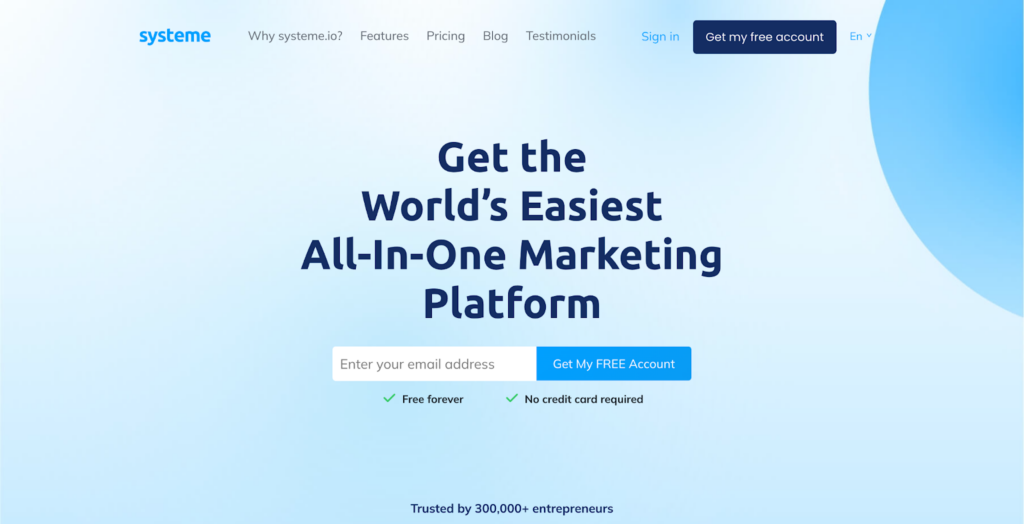
Founded in 2017, Systeme positions itself as an all-in-one marketing platform. Notably, it lists sales funnels, marketing emails, website building, and affiliate management before mentioning online courses. Even still, the Systeme platform lands itself a top spot in this list, with hundreds of positive online reviews to back up its status as an excellent platform for online course creators.
Top Systeme features:
- Market with easy-to-create sales funnels or email marketing campaigns directly on the platform
- Manage affiliates and affiliate payouts
- Create and sell digital and physical products
Systeme pricing
Systeme promises free access forever with its free plan. Should you find yourself in need of more functionality, there is, of course, the ability to upgrade to a paid plan.
- Free
- Startup ($27/month)
- Webinar ($47/month)
- Unlimited ($97/month)
Comparable to Thinkific’s free plan, Systeme’s free plan gives users access to an overwhelming majority of its features, only limiting users in the amount of emails they can send, courses they can create, blogs they can post, and communities they can build. Users can unlock unlimited potential by simply upgrading to the pretty affordable Unlimited plan.
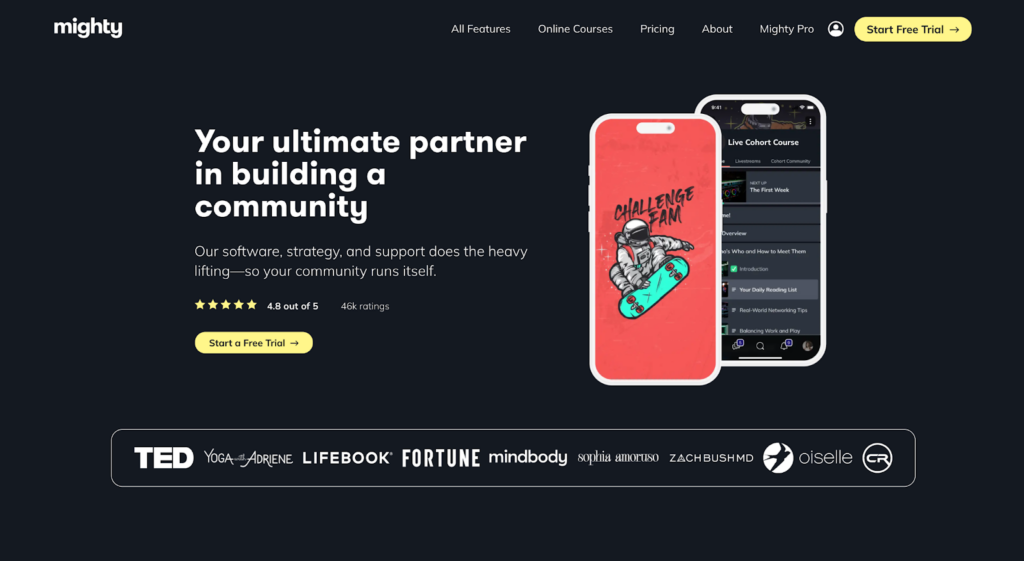
Mighty Networks, often referred to as “Mighty,” is a robust platform that primarily focuses on online courses and communities. Mighty’s online course features allow creators to craft asynchronous or synchronous experiences, assess student learning, and engage students with mobile notifications and assignments. The platform’s community features are even more impressive, offering a community feed, chat, hashtags, and community discover page for a familiar and intuitive user experience.
Top Mighty Networks features:
- Engage community members with questions, polls, and events
- Focus on community first with Mighty’s community-focused plan
- Monetize with courses, memberships, and even one-time special events
Mighty Networks pricing
Mighty Networks’ pricing plans are some of the most expensive on this list. They are:
- Community ($49/month)
- Courses ($119/month)
- Business ($219/month)
- Mighty Pro
It’s worth noting that the Community plan only grants users access to community-related features, not course-creation features.

Like most of the top alternatives to Kajabi, FreshLearn also positions itself as a one-stop-shop for course creators. It offers online courses, cohort learning, live workshops, and allows for digital downloads. With a generous free plan, instructors can create and launch their own courses, digital products, and websites without a financial commitment.
FreshLearn features:
- Create asynchronous or cohort-style online courses
- Drive revenue with coupons or affiliates
- Monetize a variety of digital downloads like ebooks and even music
FreshLearn pricing
- Free
- Pro ($39/month)
- No Brainer ($69/month)
FreshLearn’s Free plan boasts no transaction fee, unlimited digital products, video hosting, and more. Users must upgrade to access features like drip content, live classes, gamification, and email campaigns.

While Skillshare is considered an online course platform, it also falls into a unique category of platforms called an “online course marketplace.” These platforms allow you to build an online course and host it on the platform, along with many other online courses and educators. Students, whether yours or another creator’s, pay for a subscription that grants them access to the marketplace and all its courses. In most cases, creators are awarded a percentage of a student’s subscription revenue when that student enrolls in their course.
The nature of the Skillshare marketplace also means creators must follow certain requirements for online courses, meeting standards for topic, length, and activities—so not just anyone can join. On the positive side, a marketplace like Skillshare grants creators quick access to a thriving platform with an established student base. But on the other hand, you’ll also have to compete with other creators for attention.
Top Skillshare features:
- Use projects as a tool for student and community engagement
- Tap into an existing marketplace when publishing your course
- First-time creators can receive feedback from the Skillshare platform, helping them to create the best course for their audience
Skillshare pricing
Skillshare does not have a monthly subscription for creators, who are sometimes referred to as teachers or instructors. However, not everyone can publish a course on the platform. Potential creators must apply and be approved to create and publish a course to the marketplace. So, while the platform is a low-cost option for creators, it’s not accessible to everyone.

More than just an online course platform, LearnDash is also an online course plug-in. This means you can access the LearnDash features from the comfort and custom experience of your own self-hosted website. This is an excellent choice for creators who want as much control over the user experience as possible but also want the user-friendly experience of a course-building platform.
LearnDash allows creators to craft cohort-style or asynchronous experiences, leverage AI technology in content creation and drip content, offer badges and certificates, bundled offerings, and so much more.
Top LearnDash features:
- Create course content and quizzes with the help of AI
- Monetize your content with one-time purchases, memberships, subscriptions, bundles, and pre-selling
- Deploy complex student-facing customizations like learning paths and flexible prerequisites
LearnDash pricing
Of all other Kajabi alternatives in this list, LearnDash pricing has one of the more complex pricing structures. So, let’s start with what many online course creators will use: the cloud.
LearnDash Cloud
- LearnDash Cloud Starter ($29/month)
- LearnDash Cloud Growth ($49/month)
- LearnDash Cloud Pro ($99/month)
LearnDash cloud includes hosting, templates, and website customization tools. The Plugins, however, plug into an existing site and give you access to the LearnDash community or course-building features on a self-hosted site.
LearnDash Plugin and MemberDash Plugin
- One site ($199/year)
- 10 sites ($399/year)
- Unlimited ($799/year)
Finally, LearnDash offers a variety of add-ons, which allow for an improved learning experience, stronger community engagement, and improved tracking, depending on the add-ons you select.
LearnDash add-ons
- ProPanel – $49/year for one site
- Gradebook – $49/year for one site
- Notes – $49/year for one site
- GroupPlus – $49/year for one site

Like Skillshare, Udemy is also an online course marketplace. This platform focuses on video-based content, making it a great choice for creators with lecture-heavy or reading-driven content. However, because this marketplace relies heavily on video-based content, it’s not a great choice for those who need to create gamified content or want to build a community on the same platform as their course. Still, despite the platform’s limitations, it’s still a great choice for creators new to the market or with a small budget.
Udemy features:
- Upload video lectures and presentation-style content
- Allow Udemy to showcase your course to its millions of students
- Learn from the Udemy library, which includes resources on how to create and launch a successful online course
Udemy pricing
Like SkillShare’s pricing structure, Udemy does not charge an upfront rate to teach on the platform. In fact, anyone can create a course on the platform. However, to charge for your course, you must apply to be a Premium Instructor and be approved—and there are significant fees associated with charging for your course.
Instructors receive 97% of the revenue when a student purchases their course using a direct link, whether that’s a referral code or coupon code. However, if a student finds your course as a result of Udemy’s marketing or by simply browsing the marketplace, instructors only keep 37% of the revenue.

Patreon is a staple in the digital content creator space. Best known as a place for video and audio content, Patreon is an excellent choice for community-focused creators looking to connect with their audience. Creators can engage with their community in group chats, poll their audience for valuable insights, organize content into collections, and more.
Top Patreon features:
- Host podcasts, videos, music, and other artistic content
- Post and communicate directly with your audience
- Integrate with top creator platforms like Discord and Vimeo
Patreon pricing
Rather than charging creators a flat rate each month, the platform charges based on overall revenue driven on the platform. This means the creator commits to a flat monthly rate, but the dollar amount varies based on your income. The three plans are:
- Free (5%)
- Pro (8%)
- Premium (12%)
Not entirely free, the Free plan comes with a 5% monthly fee. This means Patreon keeps 5% of your income on the platform. This plan will get you basic access to the platform’s features, while the Pro and Premium plans will grant you access to more monetization models, gamification methods, and other tools.
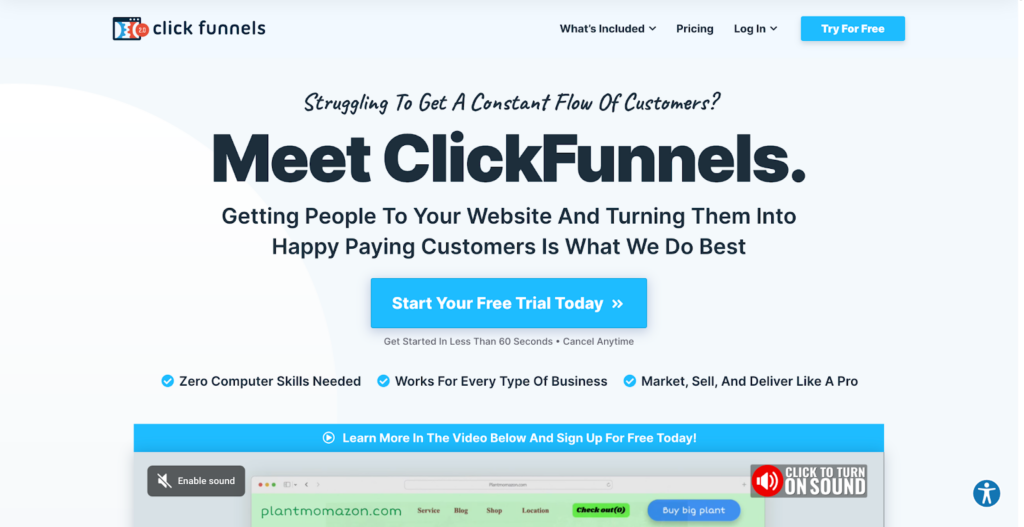
ClickFunnels is an all-in-one platform that meets more than just course creation needs. The platform aims to help users with sales funnels, website creation, online course creation, email marketing, workflows, customer relationship management, product management and sales, and more. Because ClickFunnels has a broad range of features, it’s a great choice for creators not quite sure of where they want to specialize or who are looking to scale their business.
ClickFunnels features:
- Build a website, publish blog posts, and create landing pages using a drag-and-drop editor
- Create, manage, and sell digital or physical products
- Automate your marketing and sales process with workflows
ClickFunnels pricing
ClickFunnels offers three pricing tiers:
- Basic ($147/month)
- Pro ($197/month)
- Funnel Hacker ($297/month)
Most users will be able to launch a robust business with the Basic plan, which includes one website, one domain, and unlimited courses, pages, products, and email sequences.
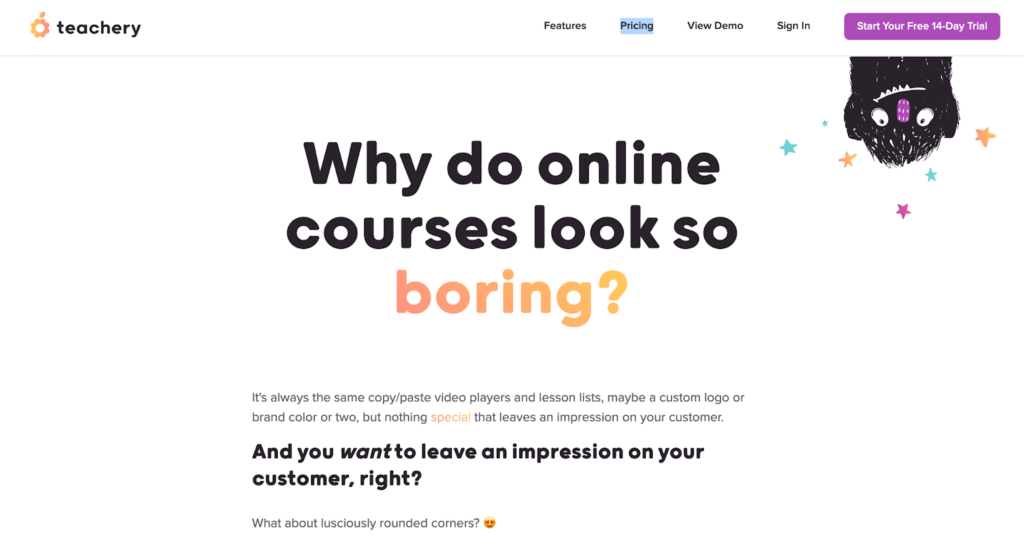
The final alternative to Kajabi in this list is Teachery. Teachery is an online course creation platform that focuses solely on course creation. The platform prides itself on helping creators craft a brand-specific experience for users, and it does so exceptionally well, with many of its courses boasting custom and visually stunning designs.
Top Teachery features:
- Build your online course with the drag-and-drop editor
- Drive more revenue with coupons, promo codes, discounts, and bundles
- Track customer analytics so you can improve over time
Teachery pricing
While Teachery says they offer two pricing plans, they effectively provide one, with the option to pay annually or monthly. The monthly plan will cost $49/month, while the annual plan is $470/year. Each plan allows for unlimited courses, students, and landing pages in addition to custom domains, promo codes, discounts, and more.
What next?
Having explored 13 of the best online course platforms on the market, it’s clear there is no one-size-fits-all solution. Choosing an online course platform for your business is a uniquely personal decision influenced by each platform’s built-in features, pricing, customer support, and integrations.
As you consider which platform is the right one for you, it’s worth reconsidering Thinkific vs. Kajabi. With 80+ more app integrations than Kajabi, more affordable plans, B2B selling options, industry-leading customer support, and more, Thinkific stands as the perfect choice for more than 50,000 course creators.
Ready to experience Thinkific for yourself? Launch your first course and start earning for free.






